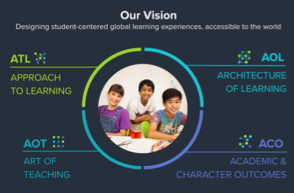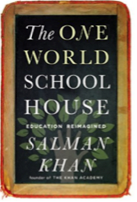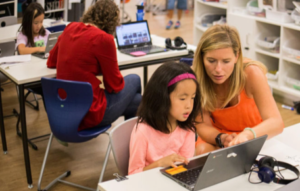Personalised Mastery Learning – my visit to Khan Lab School
Recently I was privileged to visit Khan Lab School in San Francisco*. The school is the brainchild of Salman (Sal) Khan who started Khan Academy – a non-profit educational organisation with a goal of creating a set of online tools that help educate students. The school is innovative, learner centred, is pioneering new models and questions traditional teaching practices, including the long USA summer holidays and the length of a school day. Khan Lab School is open from 8.30 am – 6 pm with compulsory attendance from 9-4 pm.
The school vision is to design student-centred global learning experiences, accessible to the world. This is achieved through a four part learning design.

1. Approach to Learning
Of all the innovation I believe the most note worthy is the idea of mastery over coverage. In most schools students study or learn a topic for 2-3 weeks and sit an end of topic test. They are given a score on the test and start the next topic. The challenge with this says Sal Khan, is if a student gets 75% on the test, traditionally that is a ‘B’ pass, which is celebrated. However what the teacher and student seems to fail to take into account is that 25% or one quarter of the curriculum knowledge or application is missing. The following term or year, when the topic is revisited and more complexity is added, the foundations are shaky. Sal Khan, in his book, The One World Schoolhouse, refers to this as the Swiss cheese effect. Each year, more and more gaps can appear in the learning and students’ grades go down, along often with their self esteem.
Each year, more and more gaps can appear in the learning and students’ grades go down, along often with their self esteem.
Mastery learning, on the other hand, requires students to keep working on a concept, topic or learning until they have mastered the ideas and application. Students must be able to show evidence of mastery to a teacher before they move onto the next level. ‘Student speak’ progressions strongly underpin this – with students having a clear picture of what they are learning and their next steps.
These progressions, alongside the mastery learning philosophy mean each students’ learning journey is personalised. Clear weekly goal setting takes place and because students know exactly what is expected of them. They join workshop groups and even request 1-1 tutoring if they feel they are really not sure.
Subsequently, teachers are also clear where each student is ‘at’ and can design learning experiences and inquiries to assist students to both deepen their knowledge and understanding, as well as demonstrate their mastery of the learning.
No grades or marks are given and students are expected to demonstrate deep understanding of their learnings. This understanding is often demonstrated in project based learning when students use their knowledge and understanding to explore real-life, augmented, and virtual contexts. Students spend half their school day learning through projects and all projects are interdisciplinary.
The day is split into two with foundational fluencies – reading, writing, maths, digital literacy and foreign language taught in the morning and project based, genius hour and studio time in the afternoons. This includes wellness, integrated arts, integrated science, civics, physics, chemistry, biology, finance, global societies, economics, and statistics.
2. Architecture of Learning
While most schools group students in age groups, at Khan Lab School, students are grouped according to an independence level. Students are given as much structure and support as they require to be successful in their academic and character growth.
The independence levels are set up in a scaffolded matrix which focuses on such factors as time management, goal mastery, resource usage, communication & comprehension, self-knowledge, motivation, focus and collaboration. Students have an opportunity twice a year to provide evidence to support their mastery at their current level and move up a level. This is student initiated. This allows for mixed aged groupings and students supporting each other from all levels.
Academic grouping is also used for the foundational fluencies.
3. The Art of Teaching
Khan Lab School has two types of teachers – advisors and learning specialists. Teachers work hours are staggered to suit the timetable.
Advisor teachers spend 30 mins each week 1-1 with each student from their class. This is a goal setting meeting in which both the student and teacher discuss progress and looks at the next steps. The key to this is having clear progressions so students know where they are at, where they are going and how to get there. This provides a personalised learning journey for each student.
setting meeting in which both the student and teacher discuss progress and looks at the next steps. The key to this is having clear progressions so students know where they are at, where they are going and how to get there. This provides a personalised learning journey for each student.
These teachers also design the afternoon project based learning for contextualised learning. This is done in collaboration with colleagues and students.
Content specialist teachers lead seminars and 1-1 tutoring sessions. Students can ‘opt in’ to seminars and book 1-1 time with a teacher throughout the day. Students may be grouped according to the results of a pre test or by interest levels.
4. Academic Character and Outcomes
A clear graduate profile has been developed to ensure students are well rounded and this plays an important part of both the weekly goal setting and the development of projects. The profile contains character strengths, cognitive skills, global citizenship, creation, purpose, independence, the foundational fluencies and deeper learning concepts.
Students build a portfolio of work to show mastery in academic and non-academic domains, from the core skills to global citizenship and more.
My Takeaways
One of my key impressions was how actively involved students were engaged in their learning, their ability to articulate their learning pathway and the sense of responsibility and independence they exhibited. I left feeling exhilarated and excited about future possibilities for developing a meaningful, comprehensive, global education, which truly creates life long learners, thinkers and well rounded human beings.
In his book, The One World Schoolhouse, Sal Khan states, “Students should be encouraged, at every stage of the learning process, to adopt an active stance toward their education. They shouldn’t just take things in; they should figure things out.”
He goes on to say, “The one thing we cannot afford to do is leave things as they are. The cost of inaction is unconsciously high, and it is not counted in dollars, euros or rupees but in human destinies.”
*My trip to San Francisco was as part of my contract at Westmount School and OneSchool Global, as their Teacher Academy Director. My task is to help embed innovative educational practices in the classrooms by providing high quality and effective professional development for teachers.
Tags: Karen Boyes, Khan Lab School, Mastery, personalised learning, transformational Learning
Published on Monday, September 25th, 2017, under Inspiration, Learning, Modern learning environment, Transformational Learning

it is great that Khan Lab is enabling deep learning t take place.
Same can be done in many NZ schools provided teachers are given more autonomy over curriculum ,time tabling and collaborative environment.
The NZ Curriculum is designed to be able to use mastery learning – it is a matter of vision, leadership and putting the systems into place.
Thanks for sharing, Karen. This was another one of your wonderful approaches to improve teaching and learning.
Wow, Karen that school sounds amazing. No wonder you came away feeling invigorated! Wonderful to see you are getting out and about and are continuing to make a difference:)
[…] Now 13 years of schooling later we receive the email. To place this email in context, this is the first time in 13 years our son has been given an award. He is an average student at best, and has struggled in his final year from what Sal Khan, from Khan Academy referred to as the Swiss Cheese Effect. […]